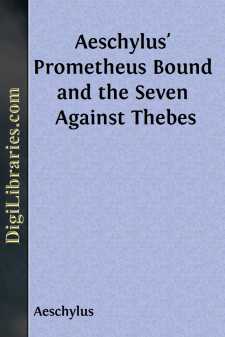Categories
- Antiques & Collectibles 13
- Architecture 36
- Art 48
- Bibles 22
- Biography & Autobiography 813
- Body, Mind & Spirit 142
- Business & Economics 28
- Children's Books 17
- Children's Fiction 14
- Computers 4
- Cooking 94
- Crafts & Hobbies 4
- Drama 346
- Education 46
- Family & Relationships 57
- Fiction 11829
- Games 19
- Gardening 17
- Health & Fitness 34
- History 1377
- House & Home 1
- Humor 147
- Juvenile Fiction 1873
- Juvenile Nonfiction 202
- Language Arts & Disciplines 88
- Law 16
- Literary Collections 686
- Literary Criticism 179
- Mathematics 13
- Medical 41
- Music 40
- Nature 179
- Non-Classifiable 1768
- Performing Arts 7
- Periodicals 1453
- Philosophy 64
- Photography 2
- Poetry 896
- Political Science 203
- Psychology 42
- Reference 154
- Religion 513
- Science 126
- Self-Help 84
- Social Science 81
- Sports & Recreation 34
- Study Aids 3
- Technology & Engineering 59
- Transportation 23
- Travel 463
- True Crime 29
Sort by:
CHAPTER I. THE INTRODUCTION OF AIRCRAFT INTO MILITARY OPERATIONS It is a curious circumstance that an invention, which is hailed as being one of the greatest achievements ever recorded in the march of civilisation, should be devoted essentially to the maiming of humanity and the destruction of property. In no other trend of human endeavour is this factor so potently demonstrated as in connection with...
more...
by:
Aeschylus
INTRODUCTION. Æschylus, the first of the great Grecian writers of tragedy, was born at Eleusis, in 525 B.C. He was the son of Euphorion, who was probably a wealthy owner of rich vineyards. The poet's early employment was to watch the grapes and protect them from the ravages of men and other animals, and it is said that this occupation led to the development of his dramatic genius. It is more easy...
more...
INTRODUCTION Bernard Mandeville's first extant book in English, Some Fables after the Easie and Familiar Method of Monsieur de la Fontaine, was published in 1703; it reappeared with additional fables in 1704 as Aesop Dress'd. Neither title reveals that, except for two original fables by Mandeville, the book consists entirely of verse translations from the twelve books of La Fontaine's...
more...
by:
Aesop
A wolf there was, whose scanty fare Had made his person lean and spare; A dog there was, so amply fed, His sides were plump and sleek; 'tis said The wolf once met this prosp'rous cur, And thus began: "Your servant, sir; I'm pleased to see you look so well, Though how it is I cannot tell; I have not broke my fast to-day; Nor have I, I'm concern'd to say, One bone in store or...
more...
by:
Aesop
LIFE OF ÆSOP. The Life and History of Æsop is involved, like that of Homer, the most famous of Greek poets, in much obscurity. Sardis, the capital of Lydia; Samos, a Greek island; Mesembria, an ancient colony in Thrace; and Cotiæum, the chief city of a province of Phrygia, contend for the distinction of being the birthplace of Æsop. Although the honor thus claimed cannot be definitely assigned to...
more...
by:
Aesop
AESOP'S FABLES The Wolf And The Lamb WOLF, meeting with a Lamb astray from the fold, resolved not to lay violent hands on him, but to find some plea to justify to the Lamb the Wolf's right to eat him. He thus addressed him: "Sirrah, last year you grossly insulted me." "Indeed," bleated the Lamb in a mournful tone of voice, "I was not then born." Then said the Wolf,...
more...
by:
Aesop
THE FOX AND THE GRAPES A hungry Fox saw some fine bunches of Grapes hanging from a vine that was trained along a high trellis, and did his best to reach them by jumping as high as he could into the air. But it was all in vain, for they were just out of reach: so he gave up trying, and walked away with an air of dignity and unconcern, remarking, "I thought those Grapes were ripe, but I see now they...
more...
by:
Benedetto Croce
INTRODUCTION There are always Americas to be discovered: the most interesting inEurope. I can lay no claim to having discovered an America, but I do claim to have discovered a Columbus. His name is Benedetto Croce, and he dwells on the shores of the Mediterranean, at Naples, city of the antique Parthenope. Croce's America cannot be expressed in geographical terms. It is more important than any...
more...
by:
Walter Pater
[213] THE "aesthetic" poetry is neither a mere reproduction of Greek or medieval poetry, nor only an idealisation of modern life and sentiment. The atmosphere on which its effect depends belongs to no simple form of poetry, no actual form of life. Greek poetry, medieval or modern poetry, projects, above the realities of its time, a world in which the forms of things are transfigured. Of that...
more...
INTRODUCTION. The special subject of the greater part of the letters and essays of Schiller contained in this volume is Aesthetics; and before passing to any remarks on his treatment of the subject it will be useful to offer a few observations on the nature of this topic, and on its treatment by the philosophical spirit of different ages. First, then, aesthetics has for its object the vast realm of the...
more...











